Risque
Le rapport « La situation mondiale des transferts monétaires » du CaLP Network indique que l’idée selon laquelle les transferts monétaires seraient plus risqués que d’autres formes d’aide est l’une des barrières principales à l’utilisation fréquente de cette modalité. Ces craintes sont liées à l’insistance de plus en plus franche des bailleurs concernant la lutte contre le terrorisme et contre le blanchiment d’argent, et à l’amenuisement des budgets destinés à l’assistance humanitaire. Le travail du CALP Network sur cette problématique vise à combattre les idées reçues, à faciliter la collaboration et à partager les apprentissages afin de veiller à ce que les transferts monétaires soient systématiquement considérés, tout comme d’autres modalités, en fonction des données probantes disponibles sur les risques réels de toutes les modalités.
Priorités actuelles
Plusieurs organisations travaillent actuellement sur les risques entraînés par les transferts monétaires. Le CALP Network cherche à identifier les synergies entre acteurs, à éviter les duplications et à définir des priorités communes sur lesquelles nous pourrions agir plus efficacement en groupe. Avec le PAM, le CALP Network co-dirige l’élément Risques, priorité du chantier du Grand Bargain sur les transferts monétaires.
Contenu présenté

Podcast: Will risk aversion hold us back from realizing the potential of CVA?
Podcast
Episode 1 of the CashCast, exploring how attitudes to risk have impacted the use of CVA in the Middle East and North Africa region.

Transferts monétaires et risques : ce qui se passe sur le terrain, reste sur le terrain (et pourquoi c’est un problème)
Blog Post
En octobre 2019, le CALP Network a facilité à Douala, au Cameroun, une réunion de partage d’expériences sur les risques liés à la protection des bénéficiaires dans les interventions monétaires. Cette réunion restreinte, organisée dans le cadre d’une série de rencontres dans différentes régions, a permis à 25 travailleurs humanitaires d’Afrique de l’Ouest et du Centre,...

Webinar: Data sharing in CVA: ethics, ownership and privacy
Event
Thematic lead
Contenu récent

Is cash better than food vouchers for Syrian refugees?
Report
A comparative analysis of the effectiveness of unrestricted cash and food restricted voucher assistance modalities for Syrian refugee households’ food security in Jordan and Lebanon.

The Role of Financial Services in Humanitarian Crises
Guidelines and Tools
More than 75 percent of adults who live in countries that are coping with humanitarian crises remain outside the formal financial system. Financial inclusion would provide both refugees and residents with a diversified set of financial products (including savings, remittances, credit, and insurance) that...

ELAN Humanitarian KYC Case Studies
Report
Know Your Customer (KYC) regulations, also known as customer due diligence, are designed to combat money laundering, terrorist financing, and other related threats to the financial system. They refer to the ID checks that financial institutions perform to comply with national financial regulations....

Rapid Assessment for market report : West Kenya and Informal settlements in Kenya.
Report
Two locations namely Mathare and Kibera slums in Nairobi as well as Kisumu, Migori and Homabay counties in West Kenya were affected by post election skirmishes after the Kenya General Elections of 8th August 2017. In September 2017 Kenya Red Cross conducted a post crisis market assessment to establish how...

Looking Back to Move Forward: Building on Learning from 2011 to Strengthen the 2017 Drought Response in Somalia Learning Report
Report
This report provides a summary of the discussions that took place during a half-day reflection workshop in May 2017. More than 40 people from national and international NGOs, the UN, donors and research organisations came together to consider lessons from the 2011 drought response, reflect on the use of...

Scaling-up CTP in Somalia: Reflecting on the 2017 Drought Response
Report
This report summarises discussions that took place during a half-day workshop in September 2017. It built on issues identified as needing action in May, as outlined in the ‘Looking back to move forward: Building on learning from 2011 to strengthen the 2017 drought response in Somalia learning report’.
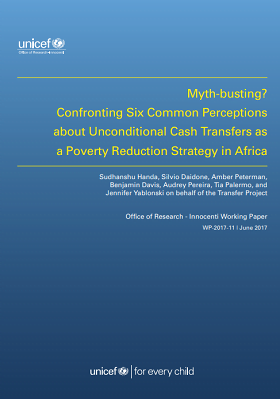
Myth-busting? Confronting Six Common Perceptions about Unconditional Cash Transfers as a Poverty Reduction Strategy in Africa
Report
This paper summarizes evidence on six perceptions associated with cash transfer programming, using eight rigorous evaluations conducted on large-scale government unconditional cash transfers in sub-Saharan Africa, under the Transfer Project. Specifically, it investigates if transfers: 1)...

The Financial Journey of Refugees Full Report
Report
This document details how refugees and migrants from the Middle East, South and Central Asia and East, West and North Africa finance their journeys and manage money along the way.

Multi-sector Market Assessment: Companion Guide and Toolkit
Guidelines and Tools
The Multi-sector Market Assessment: Companion Guide and Toolkit provides step-by-step guidance and ready-to-use tools to enable non-specialist staff to conduct market assessments and undertake market monitoring. The purpose of this Companion Guide and Toolkit is to enable Multi-Functional Teams to...
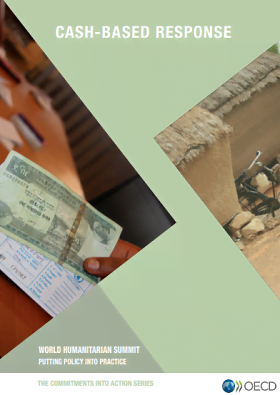
Cash-Based Response- OECD Commitments into Action Series
Report
The use of cash in humanitarian response is not new. What is new, notably after the World Humanitarian Summit and the Grand Bargain, is the policy momentum for using cash as a primary option in responding to humanitarian needs. There is a growing body of evidence demonstrating its multiple benefits as...

Community Based Targeting Report
Report
The current study aimed to gain a comprehensive understanding of SEV from the community’s perspective and to assess the targeting practices implemented by cash actors in Lebanon. It demonstrated that, according to the community, HH size had an impact on vulnerability, but that that depended on its...
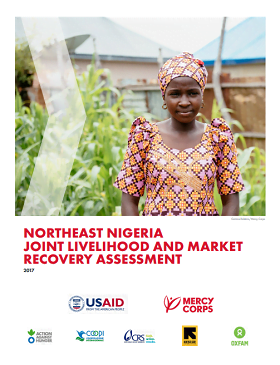
Northeast Nigeria joint livelihoods and market recovery assessment
Report
Mercy Corps Nigeria, in conjunction with Action Against Hunger, Cooperazione Internazionale, Catholic Relief Services, the International Rescue Committee and Oxfam undertook the assessment across the three most affected states in Northeast Nigeria; Adamawa, Borno and Yobe, to better understand...

Partnering with Mobile Network Operators in Zimbabwe to Deliver Cash Transfers
Report
This case study seeks to investigate and document the following: The process of engagement between MNOs and CARE. Clarity of roles between CARE/WVI as implementing agencies and MNOs. Successes and challenges in the partnership between CARE/WVI and the MNOs Measures taken to manage the impact of the...
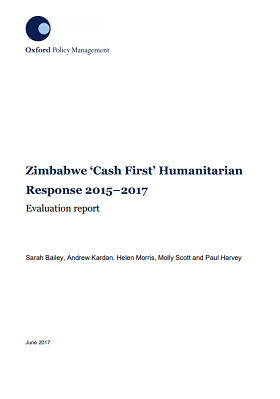
Zimbabwe ‘Cash First’ Humanitarian Response 2015–2017: Evaluation Report
Report
CARE International and World Vision International (WVI) in Zimbabwe implemented the UK Department for International Development (DFID)-funded project ‘Emergency Cash First Response to Drought-Affected Communities in the Southern Provinces of Zimbabwe’ from August 2015 to April 2017. The project...

Delivery Mechanism Mapping for Cash Based Interventions in Cox’s Bazaar Bangladesh
Report
The ‘Delivery Mechanism Mapping for Cash Based Interventions (CBI) in Cox’s Bazaar, Bangladesh’ was conducted in December 2017 by a ‘Cash Champion’ deployed from Catholic Relief Services (CRS) with the support of the Global Shelter Cluster and ECHO, and involved consultations with numerous...

Managing Cash-Based Programmes in a Volatile Markets Contexts: The Case of Delivering Cash Using Mobile Money During the Zimbabwe Cash Liquidity Crisis
Report
This case study examines how the Zimbabwe national cash crisis evolved and the ways in which affected communities and the CTP adapted to the challenges it posed. The study highlights what worked well, what was less effective, and some other possible future opportunities. It also provides operational...

Cash or in-kind? Why not both? Response Analysis Lessons from Multimodal Programming
Report
This research reviews lessons learned about response analysis from multimodal responses, that is, responses in which practitioners determined that more than one response modality between cash,vouchers, and in-kind, was a “best fit” or in which the conclusions about “best fit” changed over...

Cash Transfers in Remote Emergency Programming: Focus on risk mitigation
Blog Post
Humanitarian agencies increasingly deliver cash in locations with significant access constraints. Roger Dean, NRC’s Remote Cash Project lead, answers questions about how cash transfers can be used as an effective modality of response in such contexts.
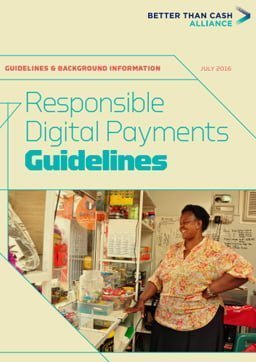
Responsible Digital Payments Guidelines
Guidelines and Tools
The focus of the Guidelines is on the common types of digital payments services provided to the financially underserved such as electronic money transaction accounts. For clients to adopt and use digital payments, they need to feel protected from risks such as loss of privacy, exposure to fraud, and...
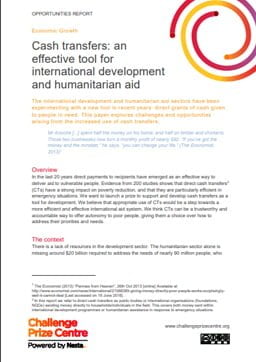
Cash Transfers: An Effective Tool for International Development and Humanitarian Aid
Report
In the last 20 years direct payments to recipients have emerged as an effective way to deliver aid to vulnerable people. Evidence from 200 studies shows that direct cash transfers (CTs) have a strong impact on poverty reduction, and that they are particularly efficient in emergency situations. This...



